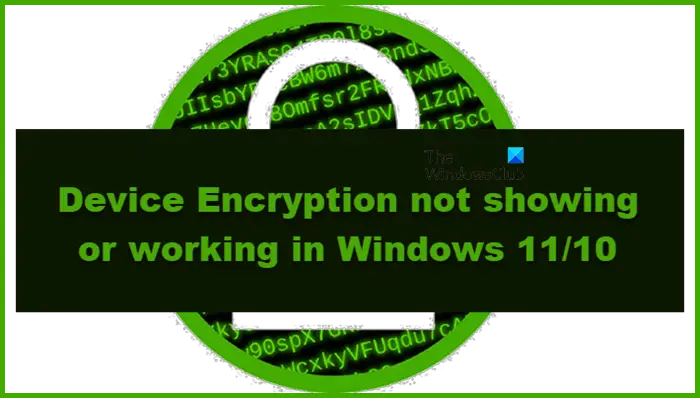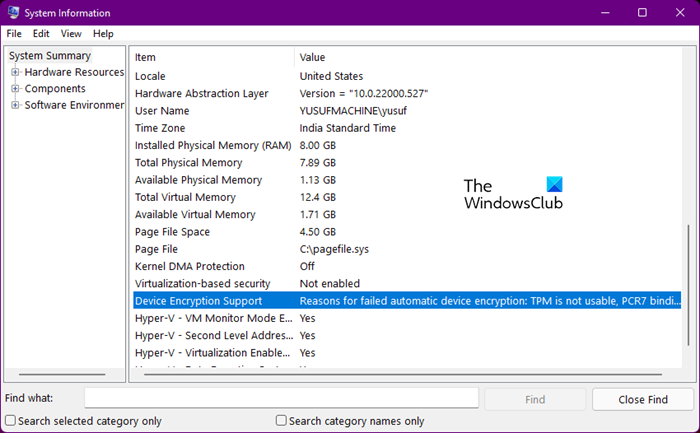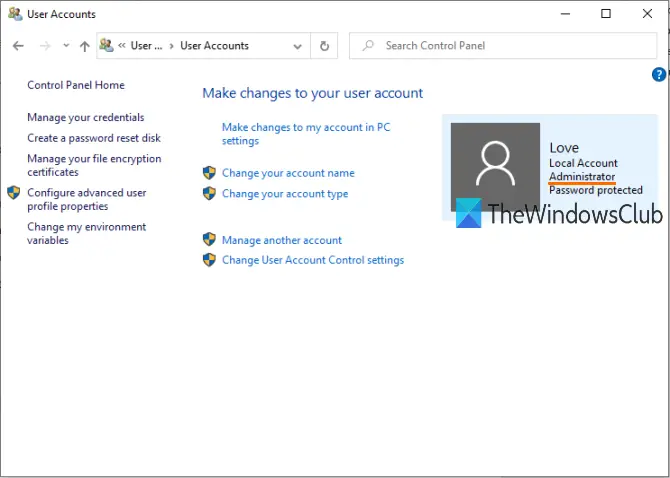The data security concern is more apparent than ever, because of this, developers are trying to inculcate as many security features as they can. The built-in Device Encryption is one of them. However, for a lot of users, Device Encryption is not showing or working. We are going to talk about this in detail in this article.

What is Device Encryption?
Encryption is basically jumbling of your data in a format that is unreadable. So that, even if a hacker is able to fetch your data, they won’t be able to make sense of it. Device Encryption takes the data which is plaintext and then converts it into an unreadable format encryption algorithm (ciphertext). This data can only be decrypted using a password or recovery key.
Why is Device Encryption not showing or working?
Device Encryption is not showing or working on Windows 11/10 Home. As it turns out, the problem is related to Sleep and Modern Standby.
When your computer is inactive for a certain amount, it gets into Sleep mode. All the programs that were running in the RAM get into low-power. Now, if Device Encryption is enabled, the Bitlocker takes the data and encrypts it. Now, the problem with Bitlocker of Windows Home is that, unlike the Pro version, it doesn’t have the advanced features needed for shorter wake time.
So, Microsoft, in order to tackle this issue, introduced Modern Standby. This feature enables allows your computer to quicken the transition between on and off states. Now, the problem with Modern Standby is that it doesn’t work alongside Device Encryption as it works by keeping a few apps running in the background in order to fetch it quicker. But to do that, the features need to decrypt the data that was encrypted when your computers entered the Sleep Mode. On a lot of systems, Modern Standy is missing, because of which Encryption won’t be enabled. There is also a bug that is stopping users from enabling it.
Fix Device Encryption not showing or working in Windows 11/10
If you are not able to encrypt data, go through the following suggestions.
- Make sure that your computer is compatible
- Update your computer
- Make sure you are an administrator
Let us talk about them in detail.
1] Make sure that your computer is compatible

First and foremost, you need to make sure that your computer is compatible to encrypt data. The following are the conditions you need to match to use Device Encryption.
- TPM Module 2.0 (Trusted Platform Module) with support for Modern Standby
- TPM must be enabled
- UEFI (Unified Extensible Firmware Interface) firmware
You can also check whether your system is compatible using the System Information app. So, search out “System Information” from the Start Menu. Once the app is launched, look for Device Encryption Support to know why your encryption is not working.
2] Update your computer
If your computer is meeting the criteria, but still Device Encryption fails to work, check if there is an update available. Since one of the reasons why you may face this problem is because of a bug, if there is a bug fix available, installing it will do the trick for you.
3] Make sure you are an administrator

You need to make sure that you are an administrator, otherwise, you won’t be able to enable Device Encryption. To check whether you are an administrator or not, follow the prescribed steps.
- Open Control Panel.
- Click on User Accounts > User Accounts (yes there are two options, one after the other).
- If you see Administrator written under your username, you are the administrator.
If you are not using an administrator account, switch to it and then try enabling it.
Hopefully, this should do the trick for you.
How do I enable encryption in Windows 11?
Device Encryption can be enabled using the Windows Settings on a Windows 11 computer. Follow the prescribed steps to enable encryption in Windows 11.
- Open Settings by Win + I.
- Click on Privacy & security.
- Go to Device encryption.
- Enable the toggle Device encryption.
This way your drive will be encrypted.
Read: What is the difference between Encryption and Hashing?
Does Windows 11 have Device Encryption?
Yes, Windows 11 have Device Encryption. Not just Windows 11, even Windows 10 has this feature. The importance of encryption can not be overlooked. The rise in cyber security threats is not hidden from anyone, not from Microsoft at the very least, which is a good thing. That is why they are trying to add features such as the one in question to secure their customer’s data. Your system just needs to meet some security criteria mentioned above and you will be able to enjoy a secure life.
What to do if Encryption is missing from your system?
If your computer is not meeting the criteria, you can not encrypt files. You should try the best file and folder encryption software to do the same. These are free apps and a great alternative to the Device Encryption of Windows.
Read next: